“How long should a biography be? Most modern readers seem to agree that the story of anyone other than a major world-historical figure or an artist of the highest significance can be adequately told in a single volume of roughly 400 pages. This is especially true of artists whose work is more interesting than their lives or personalities, as is typically the case with film actors. It is rare to encounter a movie star who, like James Stewart, also led a consequential life off-screen (he commanded a bomber squadron during World War II). Far more common are performers such as Fred Astaire or Humphrey Bogart whose ‘real’ lives are to be found in their films and whose private lives, though not without interest, do not lend themselves to memorable extended discussion…”
Archives for February 2014
Snapshot: James Baldwin in 1963
A rare TV interview with James Baldwin, originally telecast in 1963 on Miami’s WCKT:
(This is the latest in a series of arts-related videos that appear in this space each Monday and Wednesday.)
TT: Snapshot
A rare TV interview with James Baldwin, originally telecast in 1963 on Miami’s WCKT:
(This is the latest in a series of arts-related videos that appear in this space each Monday and Wednesday.)
Almanac: James Baldwin on sentimentality
“Sentimentality, the ostentatious parading of excessive and spurious emotion, is the mark of dishonesty, the inability to feel; the wet eyes of the sentimentalist betray his aversion to experience, his fear of life, his arid heart, and it is always, therefore, the signal of secret and violent inhumanity, the mask of cruelty.”
James Baldwin, “Everybody’s Protest Novel”
TT: Almanac
“Sentimentality, the ostentatious parading of excessive and spurious emotion, is the mark of dishonesty, the inability to feel; the wet eyes of the sentimentalist betray his aversion to experience, his fear of life, his arid heart, and it is always, therefore, the signal of secret and violent inhumanity, the mask of cruelty.”
James Baldwin, “Everybody’s Protest Novel”
Really big shows
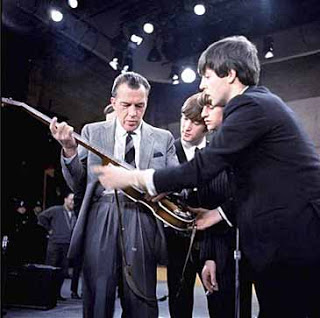 Ed Sullivan is in the news this week, sort of: Sunday marks the fiftieth anniversary of the Beatles’ first appearance on The Ed Sullivan Show.
Ed Sullivan is in the news this week, sort of: Sunday marks the fiftieth anniversary of the Beatles’ first appearance on The Ed Sullivan Show.
Most people under the age of fifty know nothing about Sullivan or his variety show, which ran on CBS from 1948 to 1971, but in its day it was a program of immense cultural significance. I’ve written about it on several occasions, most recently in Commentary in 2010:
Countless families ritually watched it together in their living rooms every Sunday night. Though [Elvis] Presley and the Beatles, who appeared in 1964, are Sullivan’s best-remembered guests, some 10,000-odd other performers and groups–among them Woody Allen, Louis Armstrong, Tony Bennett, Irving Berlin, George Carlin, Johnny Carson, Johnny Cash, Ray Charles, Noël Coward, Judy Garland, the Muppets, Edith Piaf, Richard Pryor, Barbra Streisand, and the Supremes–were seen on the show during its 23-year-run. In the Fifties and Sixties, to be booked by Sullivan was universally regarded as a sure sign that an up-and-coming performer was well on the way to stardom. “When Ed put his arm around you and pulled you over and said, ‘She’s a really funny little lady,'” Carol Burnett recalled, “America said, ‘She’s a really funny little lady.'”
I’ve long been fascinated by Sullivan’s role in the formation of our now-defunct middlebrow common culture, so I thought it might be fun to commemorate the Beatles’ American TV debut by offering a statistical snapshot of exactly who played The Ed Sullivan Show. Here are the names of some of Sullivan’s best-remembered guests, followed by the number of times they appeared on the show:
Roberta Peters (41)
Alan King (37)
The Muppets (25)
Victor Borge (24)
Pearl Bailey (23)
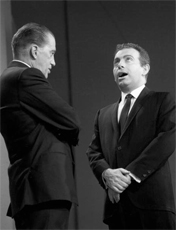 Jackie Mason (20)
Jackie Mason (20)
Louis Armstrong (18)
Tony Bennett (15)
Eartha Kitt (15)
The Supremes (15)
Sophie Tucker (15)
Richard Rodgers (14)
Nat “King” Cole (13)
Peggy Lee (13)
Johnny Mathis (13)
Richard Pryor (13)
Mickey Mantle (12)
Flip Wilson (12)
Jack Benny (11)
Cab Calloway (11)
George Carlin (11)
The Beatles (10)
Duke Ellington (10)
Sammy Davis, Jr. (8)
Ethel Merman (8)
Bob Newhart (8)
Edith Piaf (8)
Edward Villella (8)
Count Basie (7)
Willie Mays (7)
Gwen Verdon (7)
The Harlem Globetrotters (6)
Mahalia Jackson (6)
Buster Keaton (6)
Charles Laughton (6)
Liberace (6)
Birgit Nilsson (6)
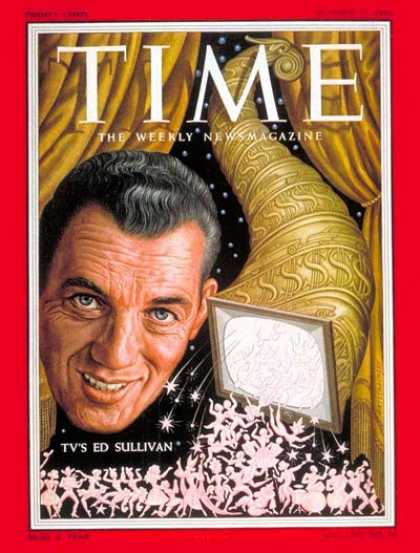 The Rolling Stones (6)
The Rolling Stones (6)
Joan Sutherland (6)
The Temptations (6)
Fred Astaire (5)
Carol Burnett (5)
Bing Crosby (5)
Mort Sahl (5)
Barbra Streisand (5)
Woody Allen (4)
Margot Fonteyn (4)
Erroll Garner (4)
Lena Horne (4)
Gladys Knight and the Pips (4)
Lauritz Melchior (4)
Itzhak Perlman (4)
Andrés Segovia (4)
Chet Atkins (3)
Richard Burton (3)
Jacques d’Amboise (3)
Buck Owens (3)
Elvis Presley (3)
The Beach Boys (2)
James Brown (2)
Ray Charles (2)
Van Cliburn (2)
George M. Cohan (2)
Noël Coward (2)
Creedence Clearwater Revival (2)
Judy Garland (2)
Buddy Holly and the Crickets (2)
Alfred Lunt and Lynn Fontanne (2)
Rudolf Nureyev (2)
Ezio Pinza (2)
Buddy Rich (2)
Jerome Robbins’ Ballets: U.S.A. (2)
Smokey Robinson and the Miracles (2)
Leontyne Price (2)
Sly and the Family Stone (2)
Mel Tormé (2)
Stevie Wonder (2)
Marian Anderson (1)
The Band (1)
Albert Brooks (1)
The Dave Brubeck Quartet (1)
The Byrds (1)
Maria Callas (1)
Johnny Cash (1)
Salvador Dali (1) 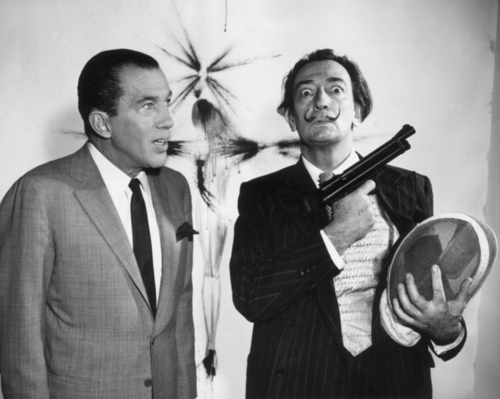
The Doors (1)
Marvin Gaye (1)
John Gielgud (1)
Jefferson Airplane (1)
The Joffrey Ballet (1)
James Earl Jones (1)
Janis Joplin (1)
B.B. King (1)
Babe Ruth (1)
Albert Schweitzer (1)
Ravi Shankar (1)
Beverly Sills (1)
Tennessee Williams (1)
* * *
The opening of The Ed Sullivan Show on February 9, 1964:
Lookback: is playing classical music an intellectual activity?
From 2004:
All of which leads me to ask: is the performance of classical music an intellectual activity? Did the breadth of Glenn Gould’s culture make him a better interpreter of Bach? I wonder. I’ve known a lot of musicians in my time, some of whom were damned smart and some of whom were (ahem) less so, and I rarely noticed any clear-cut relationship between what went into their heads and what came out of their fingers or mouths. (In my more limited experience, the same is true of dancers and painters.) I’m not saying that a stupid person can become a successful musician, but I’m not so sure that having read T.S. Eliot equips you to play Beethoven’s Op. 111 well….
Read the whole thing here.
See me, hear me (cont’d)
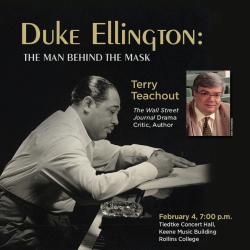 If you live in the vicinity of Winter Park, Florida, I’m lecturing about Duke Ellington tonight at Rollins College. My talk, which is called “Duke Ellington: The Man Behind the Mask,” is based on my newly published Ellington biography. A jazz combo led by Chuck Archard is accompanying me, and I’ll also be showing Ellington-related film clips and (as usual) taking questions from the audience.
If you live in the vicinity of Winter Park, Florida, I’m lecturing about Duke Ellington tonight at Rollins College. My talk, which is called “Duke Ellington: The Man Behind the Mask,” is based on my newly published Ellington biography. A jazz combo led by Chuck Archard is accompanying me, and I’ll also be showing Ellington-related film clips and (as usual) taking questions from the audience.
The event takes place at Tiedtke Concert Hall and starts at seven p.m. sharp. No tickets or reservations are required. For more information, go here.
